|
|
|
Sort Order |
|
|
|
Items / Page
|
|
|
|
|
|
|
| Srl | Item |
| 1 |
ID:
095242
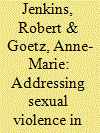

|
|
|
|
|
| Publication |
2010.
|
| Summary/Abstract |
Negotiated peace agreements rarely address the legacy of wartime sexual violence committed by state and non-state armed actors, even in cases where mass rape has been a prominent feature of the conflict. This article examines why this has been the case. It assesses the implications of UN Security Council resolution 1820 (June 2008), which calls for internationally mediated peace talks to address conflict-related sexual violence; advances reasons why doing so may contribute to more durable peace; and outlines where specific textual references to sexual violence in peace agreements could enhance the well-being of survivors and reduce the chances of brutal and widespread sexual violence persisting in the post-conflict period. The article focuses on five types (or elements) of peace agreement: (1) early-stage agreements covering humanitarian access and confidence-building measures; (2) ceasefires and ceasefire monitoring; (3) arrangements for demobilization, disarmament and reintegration (DDR) and longer-term security sector reform (SSR); (4) post-conflict justice institutions; and (5) provisions relating to reparations for victims of serious human rights abuses.
|
|
|
|
|
|
|
|
|
|
|
|
|
|
|
|
| 2 |
ID:
095247
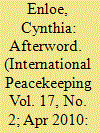

|
|
|
| 3 |
ID:
095233


|
|
|
|
|
| Publication |
2010.
|
| Summary/Abstract |
This article deconstructs the language of UN documents that relate to peace operations and highlights recurrent definitions of women as vulnerable individuals, often associated with children. The author demonstrates that the perpetuation of stereotyping language in these documents removes women's agency and maintains them in the subordinated position of victims. As a result, women are not seen as actors within their own community and agents of change in post-conflict environments. Despite the adoption of resolution 1325, the institution of the UN leaves the male monopoly of power unchallenged and presents gender mainstreaming as a non-political activity.
|
|
|
|
|
|
|
|
|
|
|
|
|
|
|
|
| 4 |
ID:
095234
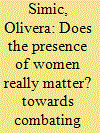

|
|
|
|
|
| Publication |
2010.
|
| Summary/Abstract |
Women are being encouraged to join peacekeeping operations as sexual violence problem-solving forces while simultaneously undertaking a complex role as 'protectors' of local women from local men and male peacekeepers. Since the adoption of Security Council resolution 1325 in 2000, the UN has urged states to deploy more women. Among the implicit assumptions underlying these calls are that an increase in the representation of women in peacekeeping operations (PKOs) will lead to a decrease in the cases of HIV/AIDS, a decline in the number of brothels around peacekeeping bases, and a reduction in the number of babies fathered and abandoned by peacekeepers after their mission comes to an end. Evidence suggests that the presence of women peacekeepers can and does foster a change in male behaviour when women are deployed in PKOs. This article argues, however, that countering abuse should not be a substitute for the more encompassing goal of improving gender balance and equality in PKOs. While there is a need to combat sexual violence in PKOs, the responsibility for prevention should be on troop-contributing countries, which need to exercise accountability and prosecute sexual violence committed by their peacekeepers. Diverting responsibility to women does not address the problem of sexual violence in PKOs, or help eradicate its causes.
|
|
|
|
|
|
|
|
|
|
|
|
|
|
|
|
| 5 |
ID:
095243


|
|
|
|
|
| Publication |
2010.
|
| Summary/Abstract |
Gender has been marginalized in security sector reform (SSR). Policy has changed in recent years, but the gap between policy and practice remains significant. This article examines gender and SSR, critiques some of the current debate on gender in SSR, outlines the challenges of adopting a gender-sensitive SSR approach and discusses the issue of gender-based violence and justice reform. The article concludes that there is a need to refocus gender in SSR discourse. Gender should be treated within the broader SSR context to avoid the separation of gender from other matters in SSR. Gender is not only about women and essentialist assumptions are not useful to the discourse. There is also a critical need to expand the focus on representation to gender mainstreaming and context sensitivity, and to avoid template models for SSR.
|
|
|
|
|
|
|
|
|
|
|
|
|
|
|
|
| 6 |
ID:
095245
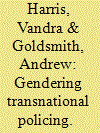

|
|
|
|
|
| Publication |
2010.
|
| Summary/Abstract |
This article explores the issues encountered by Australian women police officers on international peace keeping and capacity-building deployments in Timor-Leste, the Solomon Islands and Papua New Guinea. The discussion draws upon the literature on transnational policing as well as on women's participation in domestic police forces. The women police interviewed for this research encountered challenges working with colleagues from both the host nation and other contributing forces. The most commonly reported difficulties, however, stemmed from the behaviour of some of their Australian colleagues. These experiences point to the risk that a small number of male Australian police are reverting to a macho culture on international missions. The symbolic as well as practical implications of any kind of 'gender reversion' are likely to be significant.
|
|
|
|
|
|
|
|
|
|
|
|
|
|
|
|
| 7 |
ID:
095241


|
|
|
|
|
| Publication |
2010.
|
| Summary/Abstract |
In certain circumstances, rape, like war itself, may be politics by other means. After the adoption of UN Security Council resolution 1820, the question is no longer whether sexual violence is a threat to international peace and security, but when. To move from normative recognition to real-world impact, better understanding is needed of when sexual violence should trigger action by the Security Council in relation to situations on its agenda, or be taken into account as a factor that prompts Security Council engagement. A six-pillar test is proposed to guide such determinations, namely: when it constitutes a crime of international concern; when it attracts command responsibility; when civilians are targeted; when it proliferates owing to a climate of impunity; when there are cross-border implications; and/or when it is a ceasefire violation. Sexual violence that falls into any one or any combination of these categories concerns the Security Council, peacemakers and peacekeepers.
|
|
|
|
|
|
|
|
|
|
|
|
|
|
|
|
| 8 |
ID:
095229


|
|
|
|
|
| Publication |
2010.
|
| Summary/Abstract |
October 2010 marks the tenth anniversary of UN Security Council resolution 1325, on 'Women, Peace and Security'. Hailed as a major milestone in the struggle for gender equality in all aspects of peacemaking, peacekeeping and post-conflict recovery, the implementation of 1325 has floundered over the intervening years. Gender discourse has been submerged by the dominant UN epistemology of hegemonic masculinity, militarism and war. This essay contextualizes the struggle for resolution 1325, and provides an overview of the major challenges that still need to be addressed if UN attempts to establish a durable peace in conflict zones are to conform to the 1325 mandate.
|
|
|
|
|
|
|
|
|
|
|
|
|
|
|
|
| 9 |
ID:
095237


|
|
|
|
|
| Publication |
2010.
|
| Summary/Abstract |
This article reconceptualizes the idea of the impartiality of UN peacekeeping in light of allegations of sexual exploitation and abuse by peacekeeping personnel. It considers the role that sexual exploitation and abuse play both during and after conflict. The paper argues that sexual exploitation and abuse are political acts that bring about financial and propagandist benefits for the warring parties. It then tracks the history of neutrality in UN peacekeeping - originally defined as objective inaction against the warring parties - and its development into impartiality - now identified as unbiased interference, but with greater reference to core universal values such as fairness and justice. Peacekeepers' involvement in sexual exploitation and abuse is of political advantage to the parties and therefore breaches the principle of impartiality.
|
|
|
|
|
|
|
|
|
|
|
|
|
|
|
|
| 10 |
ID:
095231


|
|
|
|
|
| Publication |
2010.
|
| Summary/Abstract |
In recent years, increasing reference has been made to the issue area of 'women, peace and security', reflecting a set of norms that are gradually becoming institutionalized within the UN. This article explores the validity of such claims through an empirical study of the relatively newly established UN Peacebuilding Commission (PBC) and the extent to which gender language and concerns have been integrated into the latter's founding resolutions and deliberations on peacebuilding strategies. The article suggests that 'women, peace and security' concerns have emerged as a legitimate normative framework in the peacebuilding context. The PBC has served an important role in reinforcing this normative framework. However, the actual inclusion of women in strategic thinking and policy development is still dependent on the lobbying of dedicated norm entrepreneurs among member states, UN bureaucrats and nongovernmental organizations.
|
|
|
|
|
|
|
|
|
|
|
|
|
|
|
|
| 11 |
ID:
095239
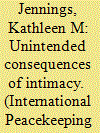

|
|
|
|
|
| Publication |
2010.
|
| Summary/Abstract |
This article assess whether peacekeeping economies are disposed to become sex tourism economies. It argues that, like sex tourism economies, peacekeeping economies are to a greater or lesser degree dependent on the exploitation of women's and girls' sexual labour. The article examines some of the gendered roles and relations that are established or reinforced by peacekeeping economies, and whether these will likely continue beyond the life of the peacekeeping operation. It argues that the similarities between peacekeeping and sex tourism economies are indicative of a possible link between foreign military presence and sex tourism, but also that the UN's position as a political, humanitarian and development actor gives it a special responsibility to prevent this happening.
|
|
|
|
|
|
|
|
|
|
|
|
|
|
|
|
| 12 |
ID:
095235


|
|
|
|
|
| Publication |
2010.
|
| Summary/Abstract |
The UN's commitment to zero tolerance for sexual exploitation and abuse, which has been strengthened ever since the Secretary-General's 2003 'Bulletin', must be understood against the general public's non-tolerance of sexual misconduct by peacekeepers. While the UN has devoted its energy to restoring the public's confidence, the implementation of the policy cannot be effective, due to the limits of the UN's command authority, without the adoption of the same policy in contingent-contributing countries, who assume even greater roles under the revised model memorandum of understanding in 2007. Furthermore, not all victims approve the UN's zero tolerance pledge, out of fear that they may lose their only recourse to making a living. While it will likely take time to alleviate existing obstacles to align all the actors involved, the general public may not be tolerant enough to allow a further moratorium.
|
|
|
|
|
|
|
|
|
|
|
|
|
|
|
|
|
|
|
|
|